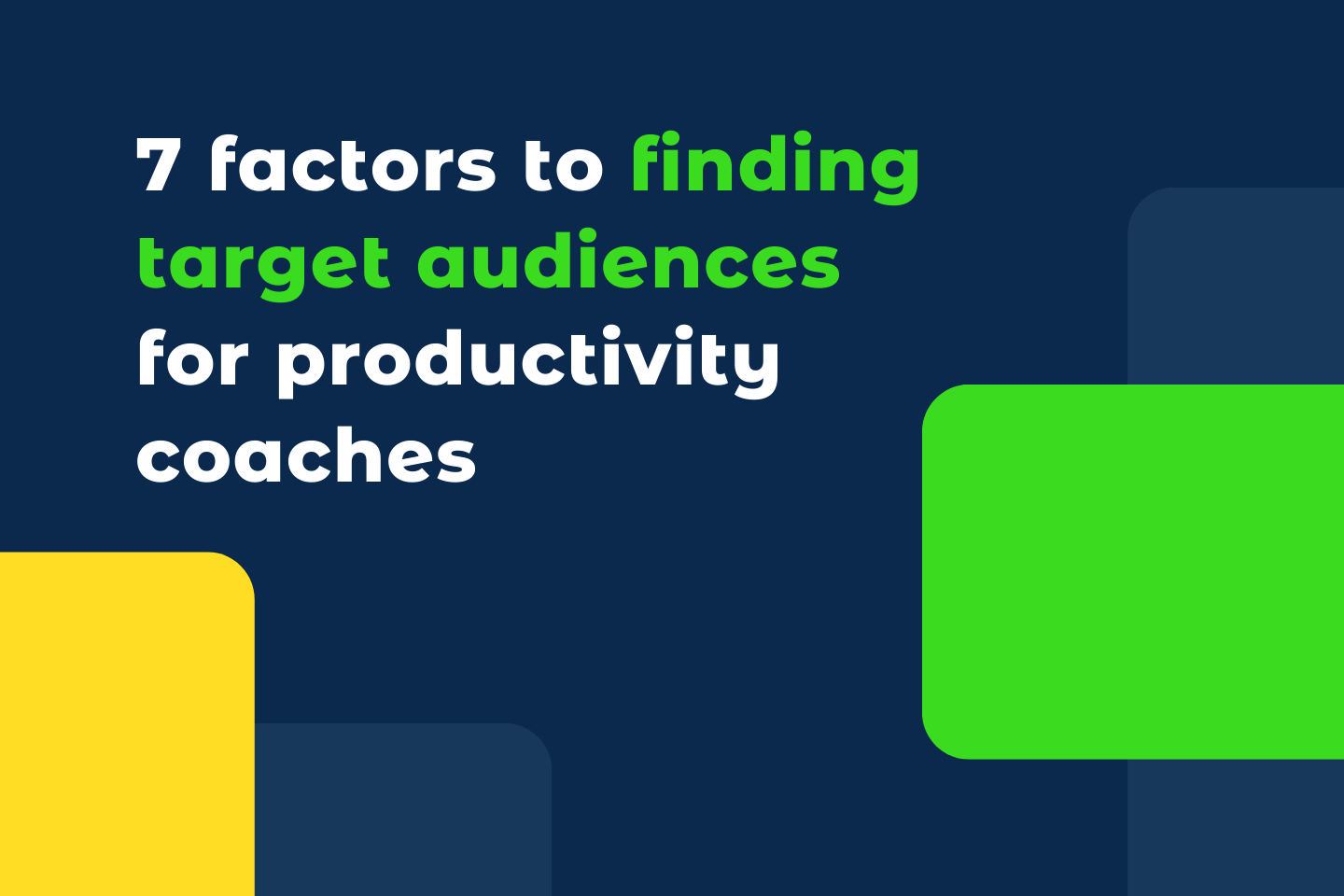If you are a productivity coach looking to make a meaningful impact, finding your target audience holds the key to success. Identifying the individuals who will benefit most from your services allows you to tailor your approach and strategies. This not only increases the chances of attracting and retaining customers but also enables productivity coaches to deliver personalized experiences and solutions that meet the specific needs and desires of their target audience, fostering long-term relationships and driving overall success.
In this blog post, we’ll uncover the seven key factors that will guide productivity coaches in identifying your ideal target audience. From demographics to pain points and specialized niches, we’ll explore the essential elements that will unlock the door to reaching and serving the right clients.
Understanding Productivity Coaching
Productivity coaching is a specialized form of coaching that focuses on enhancing individual and organizational productivity. It is a collaborative and goal-oriented process in which a productivity coach implements assessment tools to identify the client’s unique challenges, set clear objectives, and develop effective strategies to improve productivity.
Through active listening, asking thought-provoking questions, and providing valuable insights, productivity coaches help individuals overcome barriers, adopt efficient work practices, and maximize their time and energy. They offer guidance in areas such as goal setting, time management, prioritization, workflow optimization, and habit formation.
Productivity coaching fosters self-awareness, accountability, and continuous improvement. This enables people to realize their greatest potential, accomplish their goals, and have better, more fulfilling lives.
7 Key Factors in Identifying Target Audiences
Identifying the target audiences for productivity coaches involves considering several key factors to ensure effective coaching and maximum impact:
Professional Roles and Industries
Different professional roles and industries have different productivity challenges and goals. Executives, entrepreneurs, professionals in creative fields, students, and employees in various industries may require specific approaches and strategies. Identifying the target audience based on their professional roles and industries helps coaches tailor their coaching methods accordingly.
Demographics and Psychographics
Demographic factors such as age, gender, education level, and geographic location can influence productivity needs and preferences. Additionally, psychographic factors like personality traits, values, and motivations can provide valuable insights into target audiences. Understanding these aspects allows productivity coaches to customize their approach and content to resonate with their audience.
Skill Levels and Experience
Assessing the skill levels and experience of the target audience is crucial for delivering relevant coaching. Some individuals may be beginners seeking foundational productivity skills, while others may already have a solid foundation and require advanced strategies. Adapting the coaching approach to the skill levels and experience of the audience ensures effective engagement and progress.
Pain Points and Goals
Identifying the target audience’s pain points and long-term goals is vital for tailoring coaching solutions. Each group may have specific challenges, such as time management issues, difficulty setting daily priorities, or struggling with work-life balance. Productivity coaches who understand these pain points and align coaching goals with the desired outcomes of the audience can offer practical solutions and address specific needs.
Work Environment and Culture
Consider the work environment and culture in which the target audience operates. Factors like remote work, team dynamics, organizational structure, and work expectations can influence productivity. Understanding the nuances of the work environment helps coaches provide context-specific strategies and recommendations that align with the audience’s reality.
Learning Preferences and Communication Channels
People have different learning preferences and communication styles. Some may prefer one-on-one coaching sessions, while others may benefit from group workshops or online courses. Identifying the target audience’s preferred learning methods and communication channels ensures effective engagement and enhances the overall coaching experience.
Market Demand and Niche Opportunities
Assessing the market demand for productivity coaching within specific target audiences is essential for business viability. Identifying niche opportunities where there is a high demand for productivity coaching and limited competition allows coaches to position themselves in the market and build their coaching brand.
Examples of Target Audiences
Productivity coaching benefits anyone looking to build a progressive life, spend quality time with loved ones, reduce anxiety and feeling overwhelmed, and focus on what truly matters. Here are a few examples of who might need a productivity coach:
- Busy professionals. Professionals who aim to improve their time management, boost productivity, and strike a better work-life balance yet have rigorous work schedules.
- Entrepreneurs and small business owners. Individuals who run their own businesses and seek guidance on prioritization, goal setting, delegation, and managing multiple responsibilities effectively.
- Remote workers and digital nomads. Individuals who work remotely or have location-independent careers and need assistance with staying focused, maintaining discipline, managing distractions, and creating effective work routines.
- Creative professionals. Artists, writers, designers, musicians, and other creative individuals who want to overcome creative blocks, enhance productivity in their artistic pursuits, and find balance between creativity and productivity.
- Corporate teams. Organizations seeking to boost productivity and collaboration within their teams, providing coaching and training to enhance communication, time management, and project execution.
- Individuals in transition. People going through career transitions, such as job changes, promotions, or starting a new venture, who want support in adapting to new roles, setting goals, and managing their time effectively.
How Can Productivity Coaching Benefit Individuals
Productivity coaching offers numerous benefits to individuals seeking to enhance their efficiency, achieve their goals, and lead more fulfilling lives. Here are some key ways in which productivity coaching can benefit individuals:
Goal Clarity and Focus
Productivity coaching helps individuals gain clarity on their goals and establish a clear direction. Coaches work closely with clients to define and prioritize their objectives, ensuring that they align with their values and aspirations. People can direct their time and energy toward tasks that really matter when they set defined, doable goals, which lowers distractions and boosts productivity.
Improved Time Management
Productivity coaches assist individuals in identifying their time-wasting activities, overcoming procrastination, and implementing effective time management techniques. With proper guidance, they can become more successful in creating schedules, prioritizing tasks, and establishing efficient work routines. As a result, they are able to maximize their time and do more tasks in less time.
Better Work-Life Balance
Productivity coaching emphasizes the importance of maintaining a healthy work-life balance. Coaches help individuals identify and address factors that may be causing imbalance and stress, providing strategies to create boundaries, allocate time for personal activities, and recharge. This leads to improved health, less burnout, and more general life satisfaction in both the personal and professional spheres.
Increased Focus and Concentration
Many individuals struggle with distractions and difficulty staying focused. Productivity coaches provide techniques and strategies to improve concentration and eliminate or minimize interruptions. As a result, individuals develop skills such as mindfulness, task prioritization, and managing digital distractions which enhances their ability to stay focused and engaged in their work.
Effective Decision Making
Productivity coaches assist individuals in developing effective decision-making skills. They help individuals evaluate options, consider priorities, and make informed choices that align with their goals. Productivity coaches provide frameworks and strategies for decision-making and enable individuals to make quicker, more confident decisions, reducing decision fatigue and increasing productivity.
Accountability and Motivation
Productivity coaching offers individuals a valuable support system, which coaching clients value. Coaches act as accountability partners, providing guidance, encouragement, and constructive feedback to keep individuals on track. They help individuals overcome challenges, celebrate progress, and maintain motivation during the journey toward achieving their goals.
Continuous Improvement and Growth
Productivity coaching fosters a mindset of continuous improvement. Coaches empower individuals to reflect on their progress, identify areas for growth, and develop new strategies to overcome obstacles. This commitment to ongoing learning and development ensures that individuals can sustain their productivity gains and continue to thrive even after the coaching engagement concludes.
How Can Productivity Coaching Benefit Organizations
Productivity coaching can bring significant benefits to organizations, contributing to their overall success and competitiveness. Here are some key ways in which productivity coaching can benefit organizations:
Enhanced Employee Performance
In a survey conducted by Darius Foroux, author of Think Straight and Do It Today, with 2,219 participants, it was revealed that 88% of workers engage in procrastination for at least 60 minutes each day. Productivity coaching not only helps employees overcome procrastination but also helps them optimize their work processes, manage their time effectively, and set meaningful goals. As a result, organizations can experience a significant improvement in individual and team performance. Increased productivity leads to higher output, better quality work, and improved overall efficiency.
Goal Alignment and Focus
Productivity coaches work with individuals and teams to align their goals with the business’s objectives. Organizations ensuring that employees’ efforts are directed towards key priorities and desired outcomes can enhance focus and align individual and team efforts towards strategic goals. This alignment promotes a sense of purpose, boosts morale, and increases the likelihood of achieving organizational targets.
Efficient Workflow and Processes
Productivity coaches analyze and optimize workflows and processes within the organization. They identify bottlenecks, inefficiencies, and areas for improvement, and provide recommendations for streamlining operations. Implementing efficient workflows enables organizations to save time, minimize waste, and boost productivity levels across the board.
Enhanced Time and Resource Management
Time and resource management are crucial for organizational success. Productivity coaching equips employees with techniques to prioritize tasks, manage their time effectively, and make the most of available resources. This leads to better utilization of time, improved resource allocation, and increased productivity across the organization.
Improved Collaboration and Communication
Productivity coaches facilitate improved collaboration and communication among team members. They encourage effective communication practices, establish clear channels for information sharing, and foster a culture of collaboration and accountability. This enhances teamwork, reduces misunderstandings, and promotes efficient coordination among employees, leading to higher productivity and better outcomes.
Change Management and Adaptability
Organizations often undergo changes, whether it’s implementing new technologies, restructuring, or adjusting to market dynamics. Productivity coaching supports employees during periods of change by helping them adapt to new processes, systems, and ways of working. Coaches provide guidance, address resistance, and help individuals navigate through change, ensuring a smoother transition and minimizing productivity disruptions.
Employee Well-Being
Productivity coaching recognizes the importance of employee well-being and work-life balance. Productivity coaches strive to foster a positive work environment. They aim to enhance employee satisfaction by promoting healthy work practices, stress management techniques, and self-care strategies. When employees feel supported, balanced, and engaged, their productivity and commitment to the organization increase.
The Bottom Line
Understanding the key factors for finding target audiences is the secret sauce that will propel your productivity coaching program to new heights. With a clear understanding of your target audiences, you can tailor your services, craft compelling messages, and create meaningful connections that resonate with your clients’ needs and aspirations.
If you want a coaching platform that helps you deliver amazing content to your target audiences, schedule a demo of upcoach or take advantage of a risk-free trial today!

